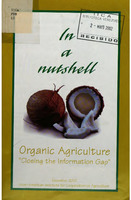| dc.contributor.author | Instituto Interamericano de Cooperación para la Agricultura (IICA) | es |
| dc.contributor.author | Francis, Diana E. | es |
| dc.contributor.author | Francis, Judith Ann | es |
| dc.contributor.author | Peterson - Polo, Joan | es |
| dc.date.accessioned | 2020-05-12T14:09:47Z | |
| dc.date.available | 2020-05-12T14:09:47Z | |
| dc.date.issued | 1993 | |
| dc.identifier.issn | 02454746 | |
| dc.identifier.uri | https://repositorio.iica.int/handle/11324/9723 | |
| dc.description | 16 páginas. Issue #6, December 2001 | es |
| dc.description.abstract | Organic farming is more than just growing chemical-free foods. It is a sustainable for of agriculture, which results in the lowest possible levels of hazards in foods. All aspects, from inputs used, to production, processing and handling practices, packaging and transportation are governed by strict regulations in accordance with international standards. The ability to label and sell foods as organic must be based on the award of an organic certificate from a approved certifying agency. Organic farming offers tremendous potential for small and medium scale Caribean farmers, once they develop a proper organic plan and can satisfy the requirements for certification. | es |
| dc.language.iso | en | es |
| dc.publisher | IICA | es |
| dc.subject | Trinidad y Tobago | es |
| dc.subject | Agricultura orgánica | es |
| dc.subject | Certificación | es |
| dc.subject | Garantía de calidad | es |
| dc.subject.other | Representación Trinidad y Tobago | es |
| dc.title | In a nutshell: Organic agriculture closing the information gap | es |
| dc.type | Informe | es |


